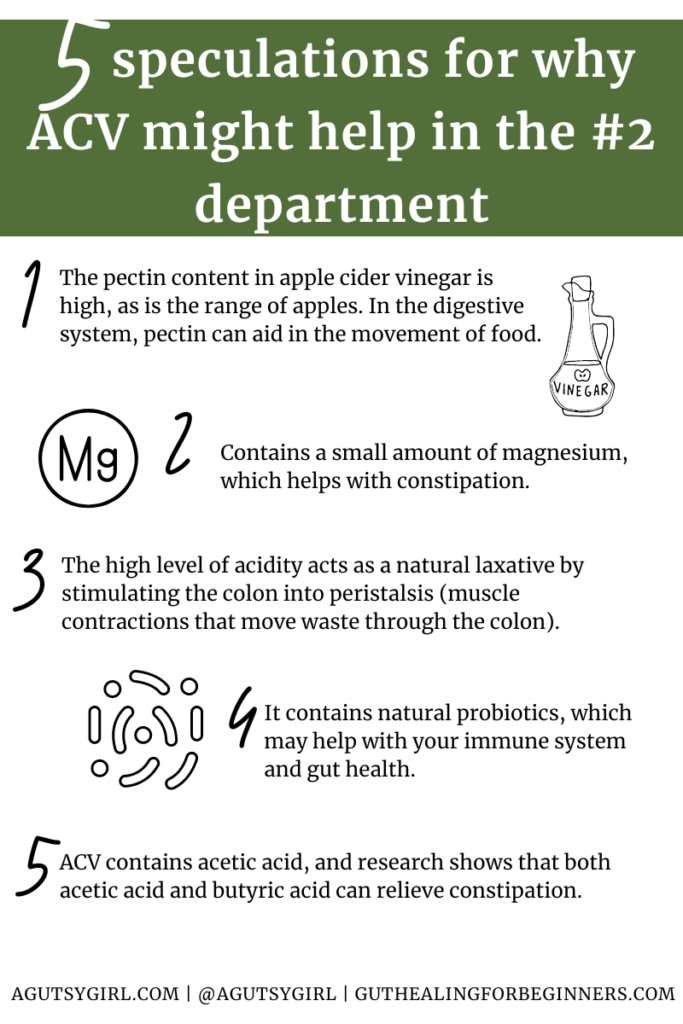Apple cider vinegar can stimulate bowel movements due to its acidic nature and potential impact on digestion. Consuming apple cider vinegar may aid in regulating bowel movements by increasing stomach acid production and promoting gut health, thereby potentially aiding in relieving constipation.
Apple cider vinegar is a popular natural remedy that has been used for its various health benefits, including potential effects on digestion and gut health. While it may contribute to improved bowel regularity for some individuals, it is essential to consider personal tolerance and any potential adverse effects before incorporating it into your routine.
Proper hydration and a balanced diet are also vital factors in maintaining healthy digestion and regular bowel movements.
What Is Apple Cider Vinegar?
Apple cider vinegar is a natural remedy that may help improve digestion, but its impact on bowel movements can vary from person to person. While some individuals may experience increased bowel movements after consuming apple cider vinegar, others may not notice any changes.
It’s important to listen to your body and consult a healthcare professional for personalized advice.
Introduction
Apple cider vinegar has gained popularity for its potential health benefits, including its impact on digestion. One of the common questions is whether apple cider vinegar can promote bowel movements. Before exploring this question, it’s essential to understand what apple cider vinegar is and how it is produced.
What Is It Made From?
Apple cider vinegar is made from the juice of crushed apples that undergo a two-step fermentation process. The first step involves yeast breaking down the sugars in the apple juice, turning them into alcohol. In the second step, bacteria are added to the alcohol solution, which further ferments the alcohol into acetic acid, the main active compound in apple cider vinegar.
How Is It Produced?
The production of apple cider vinegar begins with pressing the juice out of apples. Next, the juice undergoes fermentation, where yeast converts the sugars into alcohol. Then, acetic acid bacteria are added, which converts the alcohol into acetic acid through a process known as acetic acid fermentation. Finally, the liquid is strained and left to mature, resulting in the formation of apple cider vinegar.

Credit: agutsygirl.com
The Effect Of Apple Cider Vinegar On Digestion
Apple cider vinegar can support digestion by promoting the growth of good bacteria in the gut. This can help regulate bowel movements and alleviate constipation, leading to improved digestive health. Incorporating apple cider vinegar into your diet may help promote regularity in bowel movements.
Apple cider vinegar is believed to have various benefits on digestion. Let’s explore how it affects your digestive health and promotes bowel movements.Improving Digestive Health
Apple cider vinegar can support digestive health by aiding in the breakdown of food.- ACV can help regulate stomach acid levels.
- It may improve the absorption of nutrients from food.
- Can potentially prevent indigestion and bloating.
Promoting Bowel Movements
ACV might help with bowel movements by promoting healthy gut bacteria and digestion.- It can act as a natural laxative.
- May help with regularity and preventing constipation.
- Could contribute to a healthier gut microbiome.
How Does Apple Cider Vinegar Make You Poop?
How Does Apple Cider Vinegar Make You Poop?
Acidic Properties
Apple cider vinegar’s acidity helps to stimulate digestive enzymes.
Stimulation Of Digestive Enzymes
Apple cider vinegar triggers the release of enzymes aiding in digestion.

Credit: www.amazon.com
Benefits Of Regular Bowel Movements
Regular bowel movements are crucial for overall health and well-being, yet many people struggle with maintaining proper digestion. Achieving and maintaining regular bowel movements is essential as it has numerous benefits for the body.
Improved Gut Health
Regular bowel movements are a sign of a healthy digestive system. When waste is efficiently eliminated from the body, it reduces the risk of bloating and other digestive issues. Additionally, it supports the growth of good bacteria in the gut, promoting a balanced and healthy gut microbiome.
Detoxification And Cleansing
Adequate bowel movements help to eliminate toxins and waste products from the body, preventing the build-up of harmful substances. This natural process of detoxification is essential for maintaining overall health and well-being.
“` I hope this helps! Let me know if you need any further assistance.Tips For Consuming Apple Cider Vinegar For Digestive Benefits
If you’re looking to improve your digestive health, incorporating apple cider vinegar into your daily routine may offer some potential benefits. Apple cider vinegar has long been praised for its potential to aid digestion and promote regular bowel movements. However, it’s important to consume apple cider vinegar in the right way to maximize its digestive benefits. Here are some tips for consuming apple cider vinegar for digestive benefits:
Dosage And Dilution
When using apple cider vinegar for digestive benefits, it’s essential to pay attention to the proper dosage and dilution. While it’s generally safe to consume apple cider vinegar in small amounts, it’s crucial not to overdo it, as too much can have adverse effects on your health. It’s recommended to start with a low dosage and gradually increase it, monitoring how your body responds.
Here is a table illustrating the dosage and dilution guidelines for consuming apple cider vinegar:
| Apple Cider Vinegar | Water |
|---|---|
| 1 tablespoon | 8 ounces |
| 2 tablespoons | 16 ounces |
| 3 tablespoons | 24 ounces |
Precautions And Possible Side Effects
While apple cider vinegar can provide digestive benefits, it’s important to be aware of potential precautions and side effects associated with its consumption. Here are some precautions and possible side effects to consider:
- Apple cider vinegar is highly acidic and can cause irritation or damage to the throat and teeth if not properly diluted.
- Some individuals may experience an upset stomach or gastrointestinal discomfort when consuming apple cider vinegar.
- If you have certain medical conditions or take medication, it’s recommended to consult with your healthcare provider before adding apple cider vinegar to your diet.
- Long-term excessive consumption of apple cider vinegar may lead to low potassium levels or erosion of tooth enamel.
- It’s important to always dilute apple cider vinegar with water or another liquid to reduce its acidity and protect your health.
By following these tips, you can safely and effectively incorporate apple cider vinegar into your diet for potential digestive benefits. Remember to start with small doses, dilute it properly, and pay attention to how your body responds. If you experience any adverse effects, it’s best to discontinue use and consult with your healthcare provider.

Credit: yurielkaim.com
Frequently Asked Questions Of Does Apple Cider Vinegar Make You Poop
Does Apple Cider Vinegar Clean Out Your Bowels?
Yes, apple cider vinegar may help cleanse bowels due to its acidic nature and potential to promote digestion.
Does Apple Cider Vinegar Cause Frequent Bowel Movements?
Apple cider vinegar can potentially cause frequent bowel movements due to its high acidity and impact on digestion.
Is It Better To Drink Apple Cider Vinegar In The Morning Or At Night?
It’s better to drink apple cider vinegar in the morning as it helps kickstart metabolism and provides energy for the day.
How Does Apple Cider Vinegar Detox Your Body?
Apple cider vinegar detoxifies the body by promoting digestion, aiding in weight loss, improving circulation, and balancing pH levels. It also helps remove toxins and supports liver function.
Conclusion
Incorporating apple cider vinegar into your routine may help promote healthy digestion and relieve constipation. However, it’s important to use it in moderation and consult with a healthcare professional if you have any underlying health conditions. Remember to listen to your body and make informed decisions to support your overall well-being.


